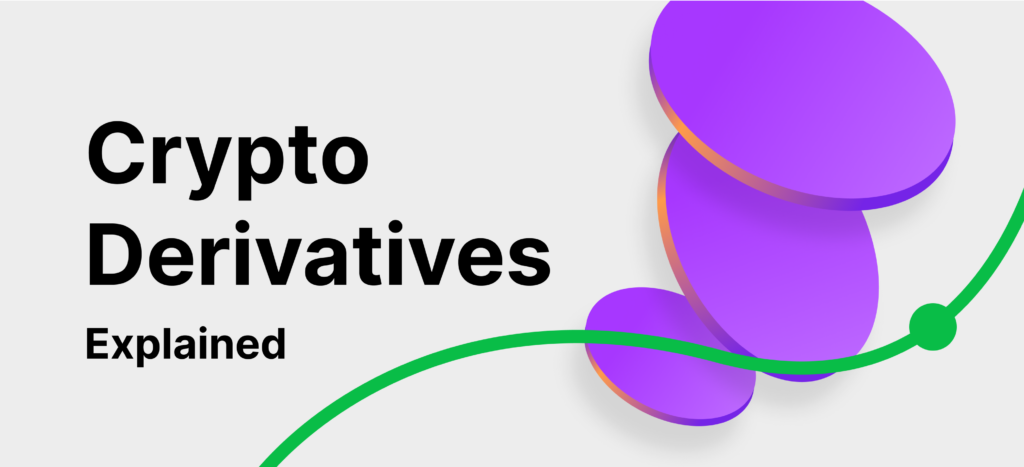Crypto derivatives are complex financial instruments that derive their value from an underlying cryptocurrency asset. This is similar to how stock options work in that they are tied to the underlying value of stocks. Thanks to their construction, derivatives allow you to speculate on the future price of a cryptocurrency without needing to hold the physical digital asset itself.
They come in various forms, with futures and options contracts being the most common types.
Futures contracts obligate you to buy or sell the asset at a predetermined price at a specific date in the future. On the other hand, options contracts give you the right, but not the obligation, to do so.
The allure of crypto derivatives lies in their ability to let traders hedge against volatility, a characteristic inherent in the crypto market. By hedging, you protect your investments against unpredictable price swings, providing a form of insurance for your portfolio.
Additionally, derivatives can be used for leverage, where you can control a large position with a relatively small amount of capital, thus amplifying the potential for profit—and risk.
What Are Crypto Derivatives?

Crypto derivatives are complex financial instruments that let you speculate on the future price of cryptocurrencies without owning the underlying asset itself. They follow the price movements of cryptocurrencies and provide various trading strategies for risk management or investment purposes.
Types of Crypto Derivatives
Crypto derivatives come in several forms, each with its own unique characteristics and uses in trading strategies:
- Futures Contracts: A futures contract is an agreement to buy or sell a cryptocurrency at a predetermined price at a specific time in the future. These contracts are standardized and traded on exchanges like BingX or Bybit.
- Options Contracts: An options contract gives you the right, but not the obligation, to buy (a call option) or sell (a put option) a cryptocurrency at a certain price before a set expiration date.
- Perpetual Contracts: Perpetual contracts are similar to futures but have no expiration date, allowing traders to hold a position for as long as they want.
- Swaps: Swaps are private agreements between parties to exchange cash flows or different financial instruments, often used to hedge risks or speculate on price movements.
Each variety of derivative serves a strategic purpose, such as hedging against price volatility or leveraging positions to amplify potential returns.
It’s essential to understand the terms and risks associated with these derivatives before engaging in trading.
Crypto Futures

In the realm of cryptocurrency derivatives, crypto futures stand out as a significant instrument, enabling you to hedge against risk or speculate on future price movements of cryptos.
What Are Crypto Futures
Crypto futures are legally binding agreements that stipulate the buying or selling of a cryptocurrency at a predetermined future date and price. Here’s what you need to know about them:
- Contract Specifications: Each future contract has specific details, such as the type of cryptocurrency, quantity, expiration date, and price.
- Standardization: Future contracts are standardized, meaning they have fixed qualities and are typically traded on regulated exchanges.
- Leverage: You can often trade futures with leverage, which means you can control a large position with a relatively small amount of capital. However, this also amplifies risks.
- Settlement: At the expiration of a futures contract, there are two types of settlement:
- Physical delivery: The actual cryptocurrency is exchanged between buyer and seller.
- Cash settlement: The difference between the spot price and the futures price is exchanged in cash.
Crypto futures offer a way to hedge against price volatility or to express a view on the future direction of a cryptocurrency’s price.
It’s important to approach them with a clear strategy and an understanding of the associated risks.
Crypto Options

In the realm of crypto derivatives, options are a fundamental instrument that gives you strategic choices for managing risk and leveraging your position in the market.
What Are Crypto Options
Crypto options are financial instruments that grant you the right, but not the obligation, to buy or sell a specified amount of cryptocurrency at a predetermined price. This price is known as the strike price. Options come with an expiration date, by which you must decide whether to execute the contract’s terms or let it expire worthless.
Understanding the components of a crypto option can be crucial:
- Premium: This is the price you pay for acquiring the option.
- Strike Price: The agreed-upon price at which the asset can be bought or sold.
- Expiration Date: The deadline for exercising the option.
There are two main types of options:
- Call Options: These give you the right to purchase cryptocurrency at the strike price.
- Put Options: Conversely, these give you the right to sell cryptocurrency at the strike price.
Your decision to exercise an option typically depends on market conditions and the intrinsic value of the option as the expiration date approaches.
If the market price is favorable, you might exercise a call or put option to achieve a profit. However, if the market price is not advantageous, allowing the option to expire may be the more prudent choice, limiting your loss to the initial premium paid.
Options can be utilized for hedging against market volatility or for speculative purposes, where you anticipate market movements aiming to profit from price swings.
This flexibility makes crypto options a valuable tool in a trader’s arsenal.
Frequently Asked Questions
Navigating the complexities of crypto derivatives can be challenging for newcomers. The answers to these frequently asked questions aim to demystify the topic and provide a clear understanding of how to engage with these financial instruments.
How do beginners implement trading strategies in crypto derivatives?
As a beginner, your first step is to gain a basic understanding of market trends and analysis techniques.
Starting with small, low-leverage positions on simpler derivative types like futures contracts helps you learn the ropes without taking on undue risk.
It’s important to practice risk management by setting stop-loss and take-profit levels.
What are the different types of crypto derivatives available?
You have access to various types of crypto derivatives, with the most common being futures, options, and swaps.
Futures contracts obligate you to buy or sell an asset at a future date, while options contracts give you the right, but not the obligation, to buy or sell at a set price.
Swaps allow you to exchange cash flows or assets with another party.
Can derivatives be purchased directly with cryptocurrencies, and if so, how?
Yes, you can directly purchase crypto derivatives with cryptocurrencies on certain platforms that specifically cater to this demand.
After choosing a suitable exchange, create an account, deposit your cryptocurrency, and select the type of derivative you wish to trade in.
Remember to review the exchange’s rules and fee structures.
What role does Bitcoin play within the crypto derivatives market?
Bitcoin is the benchmark cryptocurrency, so it holds a significant position in the crypto derivatives market.
Many derivative products are based on Bitcoin’s price, making it a heavily traded asset for hedging and speculating within this market space.
Bitcoin’s market performance often sets the tone for broader market sentiment in crypto derivatives.
Conclusion
In the realm of cryptocurrency, derivatives have introduced advanced financial strategies to your trading toolbox. Their value, intricately linked to underlying cryptocurrencies, means you can gain exposure to these digital assets without holding them directly.
- Futures Contracts: Allow you to buy or sell an asset at a predetermined price and date. Perpetual futures, a unique variant, have no expiry and mimic a spot market.
- Options Contracts: Provide you the right, but not the obligation, to buy (call option) or sell (put option) at a specific price within a set timeframe.
These instruments primarily serve two purposes: hedging against the market’s volatility and speculating on future price movements. With them, you can mitigate risk or leverage predictions for potential gain.
Blockchain Technology underpins these derivatives. It ensures decentralization and often reduces traditional financial intermediaries. You partake in a market constantly becoming more sophisticated and accessible, with perpetual futures being a significant driver of this trading volume.
Remember, trading crypto derivatives involves risks and requires a good grasp of the market. Your decision to use them should consider their complexity and your readiness to manage potential losses alongside the opportunities.
